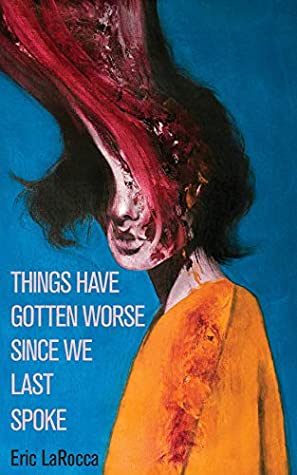Is it weird to call a horror novel charming? Because Things Have Gotten Worse Since We Last Spoke is definitely charming. Disturbing, upsetting, and frightening yes, but it just starts out so endearingly, with a quirky little exchange about an antique apple peeler via emails. Agnes, a young woman trying to sell her family’s kitchen heirloom on a queer message board, encounters Zoe when the latter offers to buy said apple peeler for $250, inclusive of shipping.
This sum is just significant enough to suspect that perhaps the inherited implement is being relinquished for the sake of some kind of financial crisis. Or perhaps this odd item needs a suitably odd means of disposal for some odd reason. We’re not sure. All we know at the outset is that a lighthearted exchange about a unitasker leaves one girl awaiting trial and one girl dead.

That’s not a spoiler, by the way. It’s in the prologue, and more power to Eric LaRocca for playing it that way. I enjoy horror that doesn’t twist itself into a tizzy about, well, twists. Shock value is rarely shocking these days, and I admire the confidence it takes to keep no secrets from the audience, relying therefore only on his skill at building character and mood. I also admire the gumption necessary to write what I suppose is a 21st century version of an epistolary novel, one told in email and chat rather than letter. It was A Thing a number of years ago, but it’s really fallen off since. I’m glad LaRocca has chosen to use it, since it enhances the sense of isolation and uncertainty running through the text.
But back to the point: is that confidence warranted? Yes, absolutely. It’s a fascinating folie à deux with some astonishingly dark developments, both psychological horror and outright gore. Can gory prose be lucid? It certainly is that. Gorgeous writing elevates the merely gross into the sublimely awful.
Do you know why the eye-torture scene in Odishon/Audition works so well? Because of the twisted tenderness on display. Anyone can have a visceral, sympathetic reaction to eyeballs, but for those who know what I’m talking about, there’s really no forgetting a tender torture. The tenderest possible gore, intent on evoking a feeling and not just the startle response.
The book might have benefited from being a tad longer. More scenes to pave the rather sizable leaps toward insanity into a smoother downward incline. More indication of what special connection existed (or seemed to exist) between these two women. Don’t get me wrong, the intimacy based on anonymity is compelling—the idea that it’s strangers above all with whom we can sometimes be our truest selves. But another few moments of emotional revelation would have been nice to provide a sturdier foundation for the madness that comes later.
There’s no faulting what is there, however. Every scene accomplishes so much for mood and character and narrative progress; it’s a master class in story construction. Read this book if you want to understand how horror should work. It won’t take you long, and you won’t be sure if you’re sorry or not it’s over. But you’ll know some things you didn’t before, even if you didn’t want to. You won’t be able to get them out of your head.
